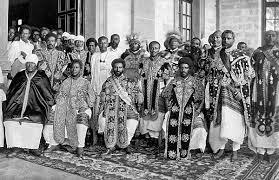
 Please wait...
Please wait...
-
@Everything Ethiopia 1+ years agoEverything there is to Ethiopia from around the web!
Dejazmach (also dä azma , short form dä a ; Tgn. däggäzmati, short form däggiyat) was one of the highest military titles of tradi-tional Ethiopia.
The prestige and rank of the bearer varied little in the course of the centuries until the title was reduced to a merely honorary one after 1941. Besides, those appointed by the provincial lords ( n gu or ras) did not enjoy the same author-ity outside their jurisdiction as the imperial ones. Ma tämä llase Wäldä Mäsqäl (MahZekr 642f.) ranks it second to ras in his undocumented protocol of ranks, but there have also been cases where a Dejazmach could eventually be more prestigious and influential (particularly if he governed a powerful region, such as Bägemd r) than an ordinary ras (cp. the case of D. G rmame). The provinces governed by such Dejazmach were known as (yänägarit agär, ‘the country of the drum of mobilization’, the nägarit being one of the articles of honour the Dejazmach was privileged to possess) or(yädä azma agär, ‘the country of a D.’). These regions enjoyed a special prestige and, hence, no one less in rank than the Dejazmach was al-lowed to govern them.
The term is made up of two words: dä and azma . The second component, which was used independently as a title, was the most im-portant one. It signifies both the function (e.g. military leadership) and the position (i.e. one who causes to direct) of the bearer. Between the 16th and the 19th cent., it was often combined with regional offices as bägemd r azma , go am azma , mäqet azma etc. The sources do not agree on the origin of the first compo-nent. Some sources conjecture that it was a derivative from an Amharic term for ‘rear’ ( Dä än). Hence, Dejazmach would signify rear-guard commander, in contrast to fitawrari, com-mander of the vanguard, qäññazma , com-mander of the right, and grazma , commander of the left wing. However, this proposition is ap-parently based on logic rather than on any lin-guistic or historical evidence. A likely explana-tion is from the root d–g, signifying outside (of the palace or the capital), ‘door, threshold’ hence ‘vanguard’ or ‘commander of the ruler’s door’.
Under normal circumstances, the military commanders (Dejazmach ras, fitawrari etc.) were sepa-rate from the court officials and their contact was regulated mainly through the office of the ligaba ( G bbi). When exactly the office of Dejazmach (dä azma nnät) was instituted is equally unclear. Tradition alleges that Dejazmach and a few other military titles were introduced in the reign of ase Dawit II. The official did, at any rate, gain prominence from the second half of the 15th cent. onward. As a replica of his imperial lord, the Dejazmach had three basic responsibilities: governor of a province, chief judge of his particular gov-ernorate and commander-in-chief of the men atarms under his jurisdiction. His court and camp were constructed in the same form as those of the sovereign and his ceremonial march was in no way different. He could appoint officers with similar titles up to a fitawrari. He could pass verdicts in matters of administrative, civil, crimi-nal and, to some extent, religious cases. The death sentence was in principle reserved for the sover-eign, though some high officials (including a D.) were granted a rope at the time of their ap-pointment as a special symbol of authority to punish criminals by hanging.
Source:
Encyclopaedia Aethiopica
 Please wait...
Please wait...
 Loading content ...
Loading content ...
 Loading content ...
Loading content ...
 Please wait...
Please wait...
Similar topics
Similar topics
 Please wait...
Please wait...


